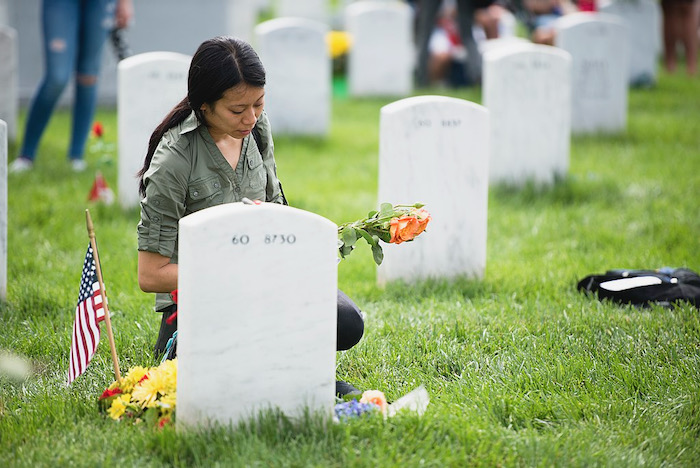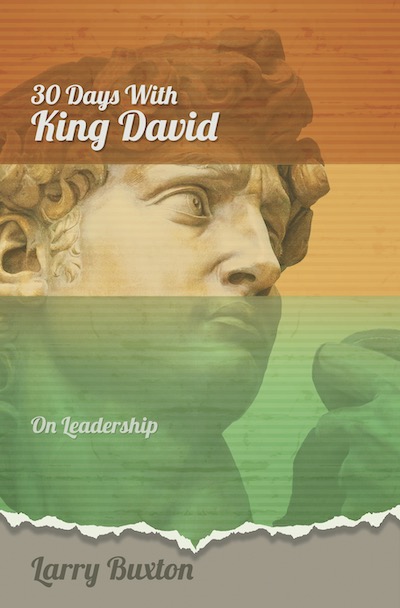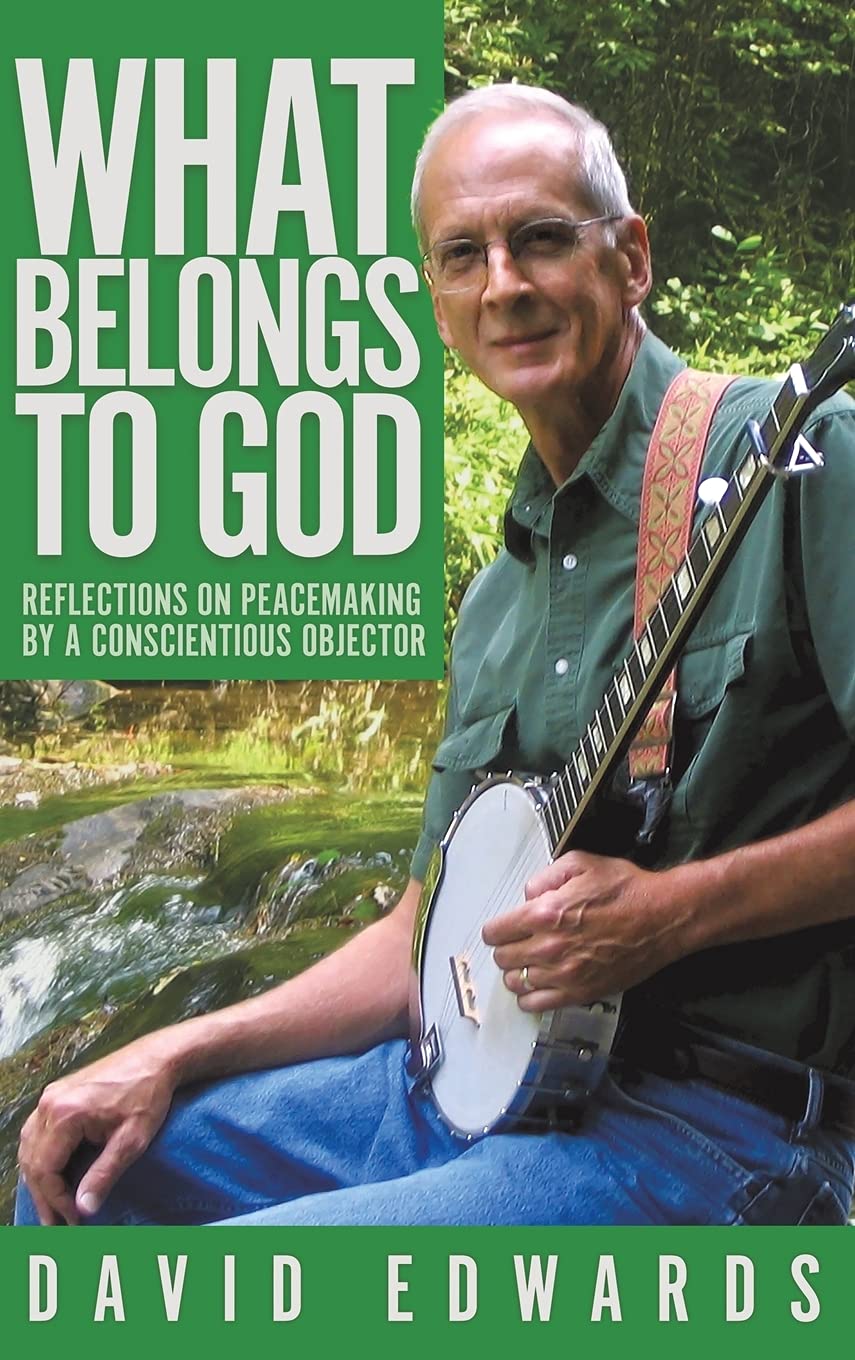
HONORING PEACEMAKERS AND WARRIORS IN A SINGLE IMAGE: U.S. Army photographer Rachel Larue took this photo at Arlington National Cemetery on Memorial Day a few years ago. It shows Audrey Hsieh laying flowers at the gravesite of U.S. Marine Corps Staff Sgt. Donald C. May Jr. who was killed in Iraq when his tank plunged off a cliff into the Euphrates River. After his death, May’s wife connected with TAPS, a nationwide nonprofit that aides families grieving the death of a loved one in the military. Hsieh volunteered to serve as the TAPS mentor to May’s young sons. In addition to helping the boys, Hsieh visits May’s Arlington grave on Memorial Day.
.
By LARRY BUXTON
Contributing Columnist
What are the iconic images of Memorial Day? A man, a woman or a child pausing in prayerful reflection in a cemetery, near the grave of a loved one who served in the military.
Such powerful images of war and peace! They bring tears to our eyes, because this is the eternal spiritual struggle that explodes into headlines in every season—especially this spring. It’s a spiritual tension in all of the world’s great faith traditions.
I was reminded of the universality of this struggle when my Muslim friend Ibrahim Anli and my editor-and-publisher David Crumm spent time with me recently on Zoom discussing the role King David plays in Islam. David Crumm then wrote about his impressions from that conversation. And I followed up with my own video meditation on these timeless questions.
In a real sense, this is an ongoing conversation in which we all share, isn’t it? That’s especially true as we reach Memorial Day.
In our initial talk, Ibrahim offered a provocative insight that I wrestled with powerfully over the past week. In Islam, he told us, King David—also known as Dawud—is honored for living “a balanced life.” It was balanced because “David was a warrior by day and a priest by night,” Ibrahim said. That is, his daytime work involved planning, leading and strategizing, focusing on military power to protect his people. David’s nighttime work involved praying, meditating and interceding, focusing on divine power to protect his people. The balance came because David equally valued both. He was a man of war and a man of prayer, and the two were of equal importance.
I nodded. As a Christian and a pastor, I liked the sound of that—at first.
Except, that “balance” bothered me all week. With apologies to my friend Ibrahim, I think his use of the word “balanced” is confusing here. “Balanced” sounds like an equilibrium, like something that is settled, at rest, peaceful, content.
Like the iconic photographs we see in newspapers, magazines and TV reports each Memorial Day, I don’t think that those people visiting the memorials in our graveyards would describe their experience as “balanced.”
Our Challenging Choices
Like most Americans, throughout my lifetime I have had a love-hate relationship with the military, both the U.S. military and other armed forces all around the world.
As a pastor for many years, I experienced families with ties to the military as strong supporters of congregational life, as generous givers and often engaged in volunteer community service.
But, like many Americans of my generation, I came of age during the Vietnam War. In fact, I came of age at a time when a lot of reflection and prayer went into my decision to file as a Conscientious Objector. This is one reason I’m pleased to see my publishing house releasing the new book, What Belongs to God: Reflections on Peacemaking by a Conscientious Objector, by the late Disciples of Christ pastor, teacher and singer-songwriter David Livingston Edwards.
David Edwards rejects the whole idea that faithful Christians can lead a life balanced between war and prayerful peace. In my case, my own choice to file as a CO became moot when it was clear that I would not be called in the draft. In David Edwards’ life, he did formally become a CO and performed alternative service at a children’s hospital. In his new book, David argues that all of us who consider ourselves people of faith must consider the call to “Choose Peace.”
This begins to sound much more like a struggle than a balance.
One thing my friend Ibrahim emphasized in his description of David’s prayer life was its overwhelming intensity. Ibrahim describes it as if David needed to pour an equal amount of physical, emotional and spiritual energy into his prayerful connection with God—because of the challenges of his life as a military ruler.
What’s the character of my peacemaking?
This raises questions we all ask need to ourselves, don’t we? What’s the character of my prayer life? And what’s the character of my peacemaking?
These questions haunt me especially as I stand before the rows of military graves in nearby Arlington Cemetery at yet another Memorial Day. I know those graves hold men and women of courage. And they also hold reluctant soldiers, frightened warriors, men and women who prayed not to be where they were.
And other graves around the world hold civilians who showed sacrificial courage in more peaceable ways. They prayed about military service, or they stood ready but were not called, or they took the risk and the consequences of saying: No.
Some of our world’s graves hold those who devoted their whole selves—sometimes gave up their lives—in peaceful action.
Just this week, I was heartbroken to read The New York Times story about Ko Chan Thar Swe, who left his role as a Buddhist monk because he felt a calling to write poetry that would peacefully but forcefully confront the military dictators now running Myanmar. For his eloquent witness, he was arrested, tortured and shot in the head. Thanks to the Times’ Hannah Beech, millions now are mourning his death as he pursued the forceful service of peace.
Honoring Sacrificial Peacemakers, too
In his new book, David Edwards raises this very question from his many years serving congregations as a pastor where the community knew that he was also a CO and pacifist. He writes, “My overall experience of serving churches as a minister who was a conscientious objector, and who felt it important to speak about Jesus’ life and teachings regarding violence, was that the church simply did not talk about it. The church in our society was so thoroughly acculturated that the default position was always in favor of nationalism and militarism. There was a consistent concern for those ‘who served’ be honored and recognized, yet no interest in the same for those who had chosen, out of their commitment as followers of Jesus and his teachings, to serve the country and world in ways other than military.”
That’s quite an indictment, isn’t it? Are our communities really balanced? Do we make time to prayerfully remember and lift up the peacemakers among us as regularly as we honor the warriors?
King David’s “balanced life” is impossible for me and for most of us, if only because thankfully most of us will never face the daily challenges David confronted in his time and place.
But what we can’t do individually—we can do communally. As a nation, we can find balance this Memorial Day by honoring both the warrior—and the pray-ers, the peacemakers.
We can rebalance ourselves as a country by honoring the sacrifice of those who fought and the conscience of those who would not. Christian faith teaches us that in being a part of the Body of Christ, we have more wholeness as a community than any one has individually.
Can we find that wholeness as a nation?
Every war has more casualties than just those who wear a uniform. When we honor that truth on Memorial Day, we the people just might stand straighter than ever before.
.
NOTE TO READERS: As our conversation continues, David Crumm also contributed to this column.
.
Care to Read More?
 You’ve already seen a link to David Edwards’ new book, above. If this column is intriguing to you, then please order a copy of Larry Buxton’s book about King. David, as well.
You’ve already seen a link to David Edwards’ new book, above. If this column is intriguing to you, then please order a copy of Larry Buxton’s book about King. David, as well.
Because of the 10-week focus on David in thousands of Catholic and Protestant congregations, this summer, Larry also is freely sharing 10 videos that match those “lectionary” readings in churches. Visit www.LarryBuxton.com/Preaching-David to find all of the videos.
Please help with this peacemaking effort. Share that link with friends. Encourage your pastor, lector, small group leader or Sunday School teacher to check out these videos. They’re easy to share—and easy to show to friends as a brief “video clip” to spark discussion in your congregation or small group.
And, YES, for those of you who pay careful attention to intellectual property: You do have our permission to stream these clips in your community.
AN EASY REMINDER: If you want to make the videos’ location even easier to remember, just go to www.LarryBuxton.com and you’ll find a link to the Preaching David video series right there on the opening page.
Interested in placing a group order of books for your class or circle of friends? Amazon ordering is quick and easy for most of us. If you are interested in 10 or more copies, email us at [email protected]

